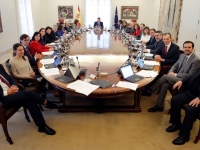Politics
Sanchez remodels his Government by strengthening the economic area
Dispenses with controversial ministers
USPA NEWS -
The Spanish Prime Minister, Pedro Sánchez, carried out this Saturday a broad remodeling of his Government, focused on the socialist part of the coalition government, with the departure of the Executive of his chief of staff, Iván Redondo, and some of the ministers with more weight in the Government, such as the first vice president, Carmen Calvo; the Minister of Foreign Affairs, Arancha González Laya; the Minister of Justice, Juan Carlos Campo; the Minister of Transportation and Secretary of Organization of the Socialist Party, José Luis Ábalos; the Minister of Science and Technology, Pedro Duque; the Minister of Education, Isabel Celáa, and the Minister of Culture and Sports, José Manuel Rodríguez Uribes.
This remodeling of the Government chaired by Pedro Sánchez seeks to reorient Spanish policy in the face of the post-pandemic time. To do this, it strengthens the economic area of the Executive and incorporates new more political and less technical ministers. Thus, the Minister of Economy, who must promote economic recovery and distribute European funds, Nadia Calviño, ascends to the position of First Vice President. For international relations, Sánchez chooses the current Spanish ambassador to France, José Manuel Albares, as the new Minister of Foreign Affairs.
For the area of Transport, Mobility and Urban Agenda, Pedro Sánchez, has elected the until now mayor of Gavá (Barcelona), Raquel Sánchez Jiménez. The until now mayor of Gandía (Valencia, east coast of Spain), Diana Morant Ripoll, will occupy the portfolio of Science and Innovation. And the mayor of Puertollano (Ciudad Real, central Spain), Isabel Rodríguez, will be the new Minister of Territorial Policy and Government spokesperson.
The changes in the Cabinet do not affect the five ministers that the far-left coalition Unidas Podemos (United We Can) has in the Government. But they do force some ministers to change their portfolio. This is the case of the until now head of Territorial Policy, Miguel Iceta, who will be in charge of Culture and Sports. The current government delegate in Aragon, Pilar Alegría, will be the new Minister of Education; and the president of the Senate, Pilar Llop Cuenca, will be the new Minister of Justice.
Important changes, according to sources from the Moncloa Palace, with many new faces for a new time. Sánchez gets rid of the most controversial ministers, but also his chief of staff, Iván Redondo, who came to have great power and extraordinary influence over the Council of Ministers. He will be replaced by Óscar López, a politician with extensive experience in regional areas and the absolute confidence of Pedro Sánchez.
The continuous confrontations between socialist ministers and Unidas Podemos ministers, together with several blows received from the Courts and the European Union, and after the socialist defeat in the regional elections in Madrid, where he came in third place, have forced the Spanish Prime Minister to redesign the Cabinet, seeking to reverse the social rejection caused by the Government and, at the same time, to rebuild the damaged Spanish economy as a result of the Coronavirus pandemic.
Liability for this article lies with the author, who also holds the copyright. Editorial content from USPA may be quoted on other websites as long as the quote comprises no more than 5% of the entire text, is marked as such and the source is named (via hyperlink).






